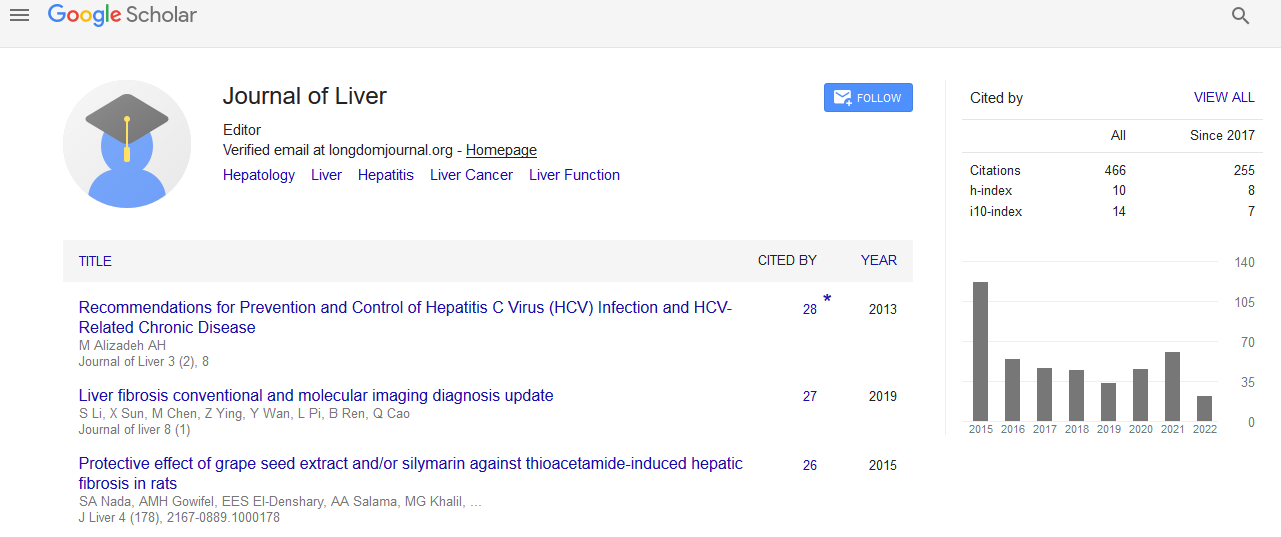PMC/PubMed Indexed Articles
Indexed In
- Open J Gate
- Genamics JournalSeek
- Academic Keys
- RefSeek
- Hamdard University
- EBSCO A-Z
- OCLC- WorldCat
- Publons
- Geneva Foundation for Medical Education and Research
- Google Scholar
Useful Links
Share This Page
Journal Flyer

Open Access Journals
- Agri and Aquaculture
- Biochemistry
- Bioinformatics & Systems Biology
- Business & Management
- Chemistry
- Clinical Sciences
- Engineering
- Food & Nutrition
- General Science
- Genetics & Molecular Biology
- Immunology & Microbiology
- Medical Sciences
- Neuroscience & Psychology
- Nursing & Health Care
- Pharmaceutical Sciences
Chronic Hepatitis Delta Virus (HDV) infection: What do we need to know?
2nd International Conference on Hepatology
May 09-11, 2016 Chicago, USA
Raffaella Romeo
University of Milan, Italy
Scientific Tracks Abstracts: J Liver
Abstract:
Chronic HDV infection has lately regained clinical importance because of the evidence of increasing prevalence in Western countries. Even though a systematic population�??s screening is still not performed, main areas of prevalence are the Mediterranean basin, the Middle-East, Central and Northern-Asia, West and Central-Africa, the Amazonian basin, Northern South-America and the Asia-Pacific region. It is estimated a global burden of about 20 million cases worldwide. Epidemiological studies on genotypes distribution have demonstrated that different clinical courses may rely upon the presence of more virulent genotypes. Progressive forms of infection are reported from Far-East and South-America, where genotypes 2 and 3, respectively, are endemic. Genotype 1 is present worldwide associated to disease with variable course. Genotype 4, typical in the Far East, is characterised by a mild hepatitis. Genotypes 5-8, described in West and Central Africa, are still poorly studied, in terms of clinical course. The different clinical course determined by genotypes may depend upon different virion assembly efficiency as well as RNA replication fitness. Cirrhosis occurs within few years from HDV infection in about two thirds of cases, and there is a three-fold higher risk of progression to cirrhosis as compared to patients with chronic HBV mono infection only. Treatment of chronic HDV infection is difficult. The ideal drug would be able of inducing HDV clearance but also HBV clearance. Several attempts have been made with various drugs (IFN, PegIFN, Ribavirin, Lamivudine, Adefovir, Tenofovir) alone or in combination, with disappointing results. Attempts on looking for new antiviral compounds are currently ongoing.
Biography :
Raffaella Romeo graduated from Medical School University of Milan in 1989. She is a specialist in Liver Disease since 1992, and completed her PhD in 1998. She did her Post-doctoral studies at Pasteur Institute Paris (France). She is a Visiting Scientist at NIH, Bethesda (MD). Since 2005, she is an elected member of the expert committee for virology and vaccines of the United States Pharmacopeia, Rockville, MD. She has a National Academic Qualification as Associate Professor of Gastroenterology since 2013. She has extensively worked in the area of molecular biology of hepatitis B, C and delta viruses as well as hepatocellular carcinoma. She is the author of several publications on international journals. She is also an invited speaker at several international meetings.

